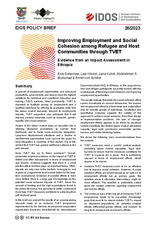Policy Brief
Improving employment and social cohesion among refugee and host communities through TVET: evidence from an impact assessment in Ethiopia
Getachew, Abis / Lisa Höckel / Jana Kuhnt / Abdirahman A. Muhumad / Armin von SchillerPolicy Brief (26/2023)
Bonn: German Institute of Development and Sustainability (IDOS)
DOI: https://doi.org/10.23661/ipb26.2023
Amharic version:
ለስደተኞች እና ለስደተኛ ተቀባይ ማህበረሰቦች የስራ እድል እና ማህበራዊ ትስስርን ለማሻሻል የቴክኒክና ሙያ ስልጠና (TVET) ያለው ሚና፡፡ በኢትዮጵያ ከተካሄደው የተፅዕኖ ግምገማ (Impact Assessment) የተገኘ ማስረጃ
(Policy Brief 27/2023)
In pursuit of employment opportunities and increased productivity, governments and donors have the highest ambitions for technical and vocational education and training (TVET) systems. Most prominently, TVET is expected to facilitate access to employment and a qualified workforce by offering its graduates skills that the labour market demands. Beyond its employment impacts, TVET supporters also anticipate that it will improve societal outcomes such as inclusion, gender equality and social cohesion.
Access to the labour market plays an essential role in allowing displaced populations to sustain their livelihoods and to foster socio-economic integration. Long-term displacement situations and a decline in resettlement opportunities have spurred the quest for local integration in countries of first asylum. It is in this context that TVET has gained additional salience in the past decade.
Does TVET live up to these promises? Overall, systematic empirical evidence on the impact of TVET is limited and often inconsistent. In terms of employment and income, evidence suggests that there is a small positive effect, but time plays an important factor. Often, impacts are only seen in the medium- to long-term, and in general, programmes tend to work better for the long-term unemployed. Evidence of societal effects is even more limited; there is a large gap of knowledge on the potential social cohesion impacts of TVET. Given the amount of funding and the high expectations found in the policy discourse, it is essential to better understand if and how TVET measures contribute to achieving their self-declared goals.
In this brief, we present the results of an accompanying research study of an inclusive TVET programme implemented by the German development cooperation organisation Deutsche Gesellschaft für Internationale Zusammenarbeit (GIZ) in Ethiopia. In this programme, host and refugee participants are jointly trained, with the explicit goals of fostering social cohesion and improving employment opportunities.
The results indicate that while the social cohesion effect seems remarkable on several dimensions, the income and employment effect is at best weak and materialises only for specific groups of individuals. Qualitative and quantitative evidence supports the validity of the approach to achieve social cohesion. More than design or implementation problems, the lack of stronger employment effects appears to be driven by structural context conditions like limited labour market absorption capacity, legal work permission constraints, gender barriers and similar hindering factors.
We derive the following main recommendations from the analysis:
- TVET measures need a careful context analysis (including labour market capacities, legal work barriers) to ensure that the necessary conditions for TVET to succeed are in place. This is particularly relevant in terms of employment effects, which appear to be elusive.
- Inclusive TVET measures seem to be an effective tool to improve social cohesion. However, if social cohesion effects are valued not just as an “add-on” to employment effects but as primary goals, the question arises if alternative interventions might be more efficient. This question is particularly salient given the modest evidence regarding employment and income effects.
- The evidence base of the impact of (inclusive) TVET programmes needs to be expanded. Knowledge gaps that need to be closed include TVET’s impact on displaced populations, its potential societal effects, differential gender effects, and medium- to long-term employment and income effects.
Kontakt
Cornelia Hornschild
Koordinatorin Publikationen
E-Mail Cornelia.Hornschild@idos-research.de
Telefon +49 (0)228 94927-135
Fax +49 (0)228 94927-130
Alexandra Fante
Bibliothekarin/Open Access-Koordinatorin
E-Mail Alexandra.Fante@idos-research.de
Telefon +49 (0)228 94927-321
Fax +49 (0)228 94927-130





